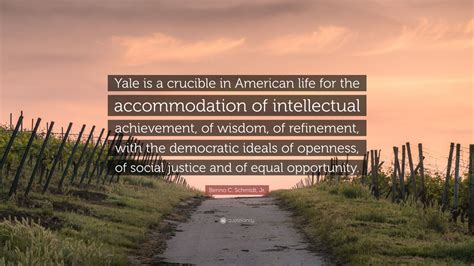A Quote by Howard Zinn
Scholars, who pride themselves on speaking their minds, often engage in a form of self-censorship which is called "realism." To be "realistic" in dealing with a problem is to work only among the alternatives which the most powerful in society put forth. It is as if we are all confined to a, b, c, or d in the multiple choice test, when we know there is another possible answer. American society, although it has more freedom of expression than most societies in the world, thus sets limits beyond which respectable people are not supposed to think or speak.
Quote Topics
Alternatives
Although
American
American Society
Among
Another
Answer
Beyond
Censorship
Choice
Confined
Dealing
Engage
Expression
Form
Forth
Freedom
Freedom Of Expression
Know
Limits
Minds
More
Most
Most Powerful
Multiple
Multiple Choice
Often
Only
People
Possible
Powerful
Pride
Problem
Put
Realism
Realistic
Respectable
Scholars
Self
Self-Censorship
Sets
Societies
Society
Speak
Speaking
Supposed
Test
Than
Themselves
Think
Thus
Which
Work
World
Related Quotes
Society will develop a new kind of servitude which covers the surface of society with a network of complicated rules, through which the most original minds and the most energetic characters cannot penetrate. It does not tyrannise but it compresses, enervates, extinguishes, and stupefies a people, till each nation is reduced to nothing better than a flock of timid and industrious animals, of which the government is the shepherd.
The most serious problems of freedom of expression in our society today exist on our campuses. The assumption seems to be that the purpose of education is to induce correct opinion rather than to search for wisdom and to liberate the mind....Attitudes on campuses often presage tendencies in the larger society. If that is so with respect to freedom of expression, the erosion of principle we have seen throughout our society in recent years may be only the beginning.
It is in the capacity to love, that is to SEE, that the liberation of the soul from fantasy consists. The freedom which is a proper human goal is the freedom from fantasy, that is the realism of compassion. What I have called fantasy, the proliferation of blinding self-centered aims and images, is itself a powerful system of energy, and most of what is often called 'will' or 'willing' belongs to this system. What counteracts the system is attention to reality inspired by, consisting of, love.
The true function of logic ... as applied to matters of experience ... is analytic rather than constructive; taken a priori, it shows the possibility of hitherto unsuspected alternatives more often than the impossibility of alternatives which seemed prima facie possible. Thus, while it liberates imagination as to what the world may be, it refuses to legislate as to what the world is
Each member of society can have only a small fraction of the knowledge possessed by all, and...each is therefore ignorant of most of the facts on which the working of society rests...civilization rests on the fact that we all benefit from knowledge which we do not possess. And one of the ways in which civilization helps us to overcome that limitation on the extent of individual knowledge is by conquering intelligence, not by the acquisition of more knowledge, but by the utilization of knowledge which is and which remains widely dispersed among individuals.
Love can't flourish in a "society" based on money and meaningless work, but rather requires complete economic, as well as personal, freedom, leisure time and the opportunity to engage in intensely absorbing, emotionally satisfying activities which, when shared with those you respect, lead to deep friendship, but which our "society" provides practically no opportunity to engage in.
There is one vice of which no man in the world is free; which every one in the world loathes when he sees it in someone else; and of which hardly any people, except Christians, ever imagine that they are guilty themselves. […] There is no fault which makes a man more unpopular, and no fault which we are more unconscious of in ourselves.[…]The vice I am talking of is Pride or Self-Conceit: and the virtue opposite to it, in Christian morals, is called Humility.
When I consider the multitude of associated forces which are diffused through nature - when I think of that calm balancing of their energies which enables those most powerful in themselves, most destructive to the world's creatures and economy, to dwell associated together and be made subservient to the wants of creation, I rise from the contemplation more than ever impressed with the wisdom, the beneficence, and grandeur, beyond our language to express, of the Great Disposer of us all.
At present, when the prevailing forms of society have become hindrances to the free expression of human powers, it is precisely the abstract branches of science, mathematics and theoretical physics, which ... offer a less distorted form of knowledge than other branches of science which are interwoven with the pattern of daily life, and the practicality of which seemingly testifies to their realistic character.
All manners of freedom, including freedom of expression, freedom of conscious, freedom of thought...it accepts tolerance. But it is not an atheist society. Religion is the private affair of an individual...be present in the public domain, but state has to be clearly separated from religion. When I'm speaking, I'm speaking only for myself. At the same time, I know that these ideas have wide support among the Iranian population.
We forget that, although each of the liberties which have been won must be defended with utmost vigour, the problem of freedom is not only a quantitative one, but a qualitative one; that we not only have to preserve and increase the traditional freedom, but that we have to gain a new kind of freedom, one which enables us to realize our own individual self; to have faith in this self and in life.
The history of man so far is nothing to brag about, from the standpoint of our ideas - and what I mean is, that in comparison with most other societies, our present-day American society has achieved things which are remarkable: material wealth, greater than for any other nation; a relative freedom from oppression; a relative mobility; a spreading of art, of music, of thought, which is also rather unique.






































